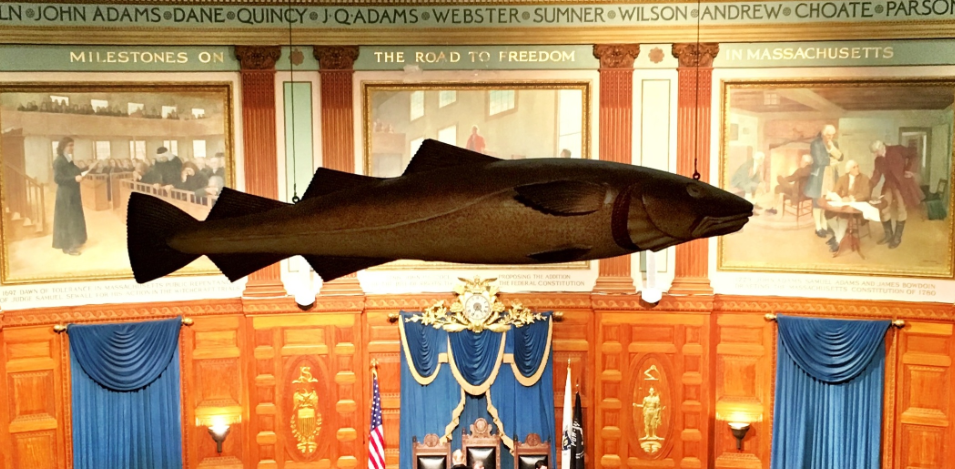I Think I Found My Favorite Wikipedia Entry

Hi!
I spend a lot of time on Wikipedia, as you probably could imagine. It’s a great way to get a background understanding of many of the stories I share here, or some of the terms/key players in those stories, or the like. And this week, someone told me about the theft of the Sacred Cod of Massachusetts — and again, I went to Wikipedia to learn more.
And I realized I can’t write that story here. Not because it’s inappropriate, but because Wikipedia’s editors did such a good job that I could never do it justice. Instead, you get this Weekender version of the story.
The Cod itself isn’t that interesting — it’s a four-foot, 11-inch (150 cm) wood carving of a fish. It hangs in the state capitol, in the chamber that the House of Representatives meets in. There’s a pictured of it above and it looks cooler than it is because of the false perspective created by the camera placement. The fish is old, dating back to the 1780s, but it isn’t really revered in any meaningful way. No one prays to it, kisses it, or anything like that, and it doesn’t even sing “Take Me to the River.” But in 1933, a bunch of students from the Harvard Lampoon — that’s Harvard’s humor magazine — stole the Cod. I’m going to let Wikipedia take it from here. (I’ve taken out all the internal citations to make this more readable.)
Meanwhile, Boston mayor James Michael Curley received a telephone message: “Tell the Mayor that when the Sacred Cod is returned it will be wrapped in the municipal flag, now flying in front of City Hall. Try and catch us when we cop the flag. Lafayette Mulligan, we are here.” “Indignant” police dragged the Charles River and, acting on a tip that a Lampoon editor had flown to New Jersey with the Cod, had the plane searched on landing; the tip turned out to be a red herring.
“Red herring!” I love it. But that’s not my favorite part. Here’s how the section on the 1933 theft ends:
Eventually a mysterious telephone call directed Harvard official Charles R. Apted to West Roxbury, where he was met by an automobile which he followed into some woods; there two young men, with collars up and hatbrims down, handed him the Cod (not wrapped in any flag) before speeding away. In the early hours of April 29, after repairs to three damaged fins, the Sacred Cod was re-hung in the House chamber, “six inches [15 cm] higher [than] the reach of any individual. A stepladder will be needed to remove it in the future.”
And here’s how the section on a second theft — which immediately follows the story of the Harvard Lampoon heist — begins:
Using a stepladder, on November 14, 1968, students at the new Boston campus of the University of Massachusetts took the Sacred Cod[.]
I can’t do better than that. No way, no how. The full Wikipedia entry is here if you’re interested.
Oh, also, the Massachusetts Senate has a fish hanging in its chamber, too. It’s made of brass and is colloquially called the “Holy Mackerel.”
Monday: Baseball’s Strangest Trade: This really isn’t a baseball story.
Tuesday: But Where Did All the White Dog Poop Go?: Or, more accurately, why did it go away?
Wednesday: New York City’s War on … Pinball?: From my first book comes this story about Fiorello LaGuardia’s efforts to slay the silver ball.
Thursday: The Dark History of Groomsmen: The number of people who wrote in to share that they noticed my little easter egg is… inconceivable! 😀
And some other things you should check out:
Some long reads for the weekend:
1) “The case the internet got wrong” (Capital Daily, 28 minutes, January 2023). In 2008, a real estate agent was murdered in Canada during a sham property viewing — as the Wikipedia entry on her murder states, she was “lured to meet a couple (a man and a woman) posing as prospective clients.” The crime remains unsolved and internet gumshoes have taken to trying to solve it from their phones and keyboards — with decidedly poor results. Misinformation is everywhere, as this story explores — and it’s ruining people’s lives, as they’re being wrongly connected to a brutal murder that no one has truly yet to solve.
2) “Everything you think you know about homelessness is wrong” (Noahpinion, 9 minutes, March 2023). This isn’t very well written, I don’t think. The statistical comparisons that he makes are the “ah ha” moments and should have been how he started it — they really drive the point home that the factors many assume are the root cause of homelessness probably aren’t. So, I grabbed three of the stats, below.
Consider Mississippi, which has among the worst healthcare systems in America, but the lowest homelessness rate. If mental health were a primary factor in homelessness, wouldn’t a state like Mississippi, which catastrophically fails to address mental illness, have among the highest homelessness rates? But it doesn’t.
[ . . . ]
Take for example West Virginia, which has the single worst drug overdose mortality rate in the country, but among one of the lowest homelessness rates in the country.
[ . . . ]
High poverty cities like Detroit (31.8% poverty) have among the lowest homelessness rates in America, while low poverty cities like San Francisco (10.3% poverty) have among the highest homelessness rates in America.
3) “No coach, no agent, no ego: the incredible story of the ‘Lionel Messi of cliff diving’” (The Guardian, February 2023).
Have a great weekend!
Dan
